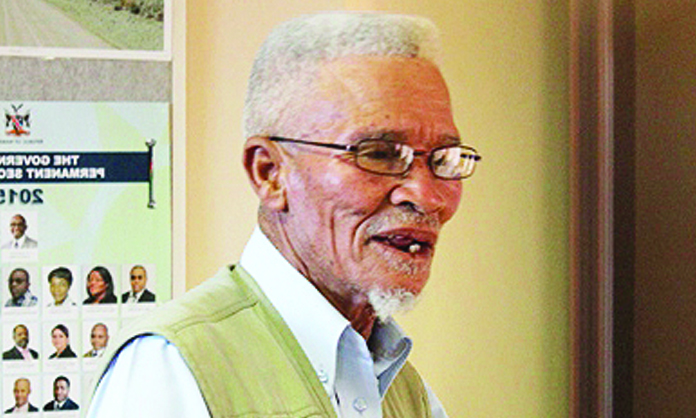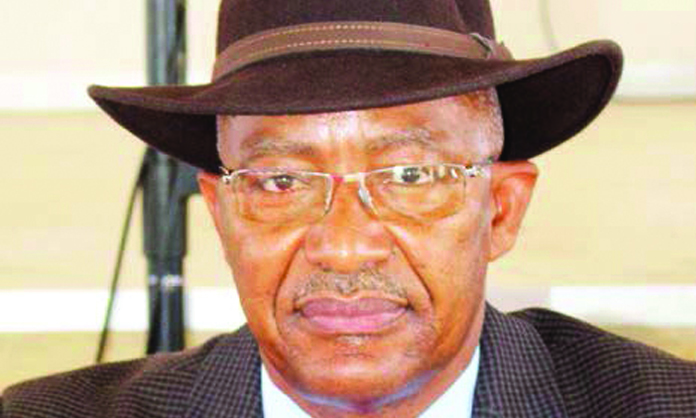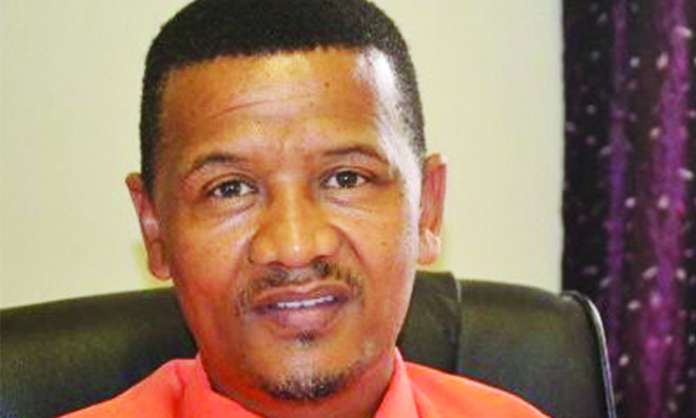Political squabbles and simmering family feuds have plunged eight chieftaincies into limbo for eight years, leaving communities longing for resolution and casting a long shadow over traditional leadership in Namibia.”
In the past few years the government has rejected the chieftaincy of eight traditional leaders for various reasons.
They include Damara chief Justus //Garoëb, academic Mutjinde Katjiua, who wants to be recognised as the paramount chief of the Ovaherero people, Dawid Gertze of the //Hawoben traditional community, and Johannes Fleermuys of the Goliath Traditional Authority.
//Garoëb has applied to be recognised as the paramount chief of the Damara people, and also as the chief of the /Nukhoen traditional district in the Kunene region.

His application was submitted last year and was turned down by minister of urban and rural development Erastus Uutoni last September.
The Bondelswarts Traditional Authority has been without a chief since chief Anna Katrina Christians’ death in 2011, followed by the death of acting chief Josef Christians in a car accident in 2015.
Up to date, the Bondelswarts Traditional Authority and the royal house could not agree on who to appoint as chief.
At Berseba, the Goliath traditional authority is still seeking recognition, while chief Johannes Isaak of the /Hai-
/Haua has been recognised by the government.
‘UNNECESSARY DISPUTES’
Chief Isaak of the /Hai-/Haua Traditional Authority at Berseba in the //Kharas region says political influence causes unnecessary leadership disputes.
He says many Nama tribes are not enjoying access to ancestral land, because they are not recognised by the government due to political influence.
“Nama traditional leaders have in the past requested adherence to existing laws and the review of the Traditional Authorities Act to prevent political influence,” he says.
‘EVERYONE WANTS RECOGNITION’
A case in point, Isaak says, is the coronation and subsequent recognition of Ishmael Witbooi as Witbooi Traditional Authority kaptein at Gibeon in the Hardap region, after then-minister of urban and rural development Peya Mushelenga approved his chieftainship application, while that of Solomon Witbooi was also lying on his desk.
The spokesperson of the Zeraeua Traditional Authority at Omatjete, Fabianus Uaseuapuani, says there is a common misunderstanding of the concept traditional authority, noting that “all want to be recognised, while some are already recognised”.
The recognition policy, he says, mandates having a specific area of jurisdiction.
Yet some individuals believe they should rule “all over the country”.
These claims, according to Uaseuapuani, lack both legal and historical substantiation.
He says some individuals are only after status, not community service.
Speaking at a meeting of traditional leaders at Swakopmund in December, president Hage Geingob expressed concern over the proliferation of traditional authorities, succession disputes and conflicts among them.
He urged traditional authorities to resolve these issues internally, as they are putting strain on government resources.
Solomon and Ishmael Witbooi are still awaiting a Supreme Court verdict on an appeal launched by Ishmael.
In his appeal, Ishmael wants the Supreme Court to overturn the judgement of Windhoek High Court judge Thomas Masuku in 2022, which nullified Mushelenga’s decision to appoint him as the leader of the Witbooi Traditional Authority.

In his ruling, Masuku overturned the former minister’s designation of ‘kaptein’, which had been made in April and May 2019, and also invalidated the president’s recognition of Ishmael as the traditional leader in a proclamation published in August 2019.
Masuku said Mushelenga abdicated his duties to properly consider the two competing leadership applications when he decided to adopt the legal opinion provided by the attorney general’s office “lock, stock and barrel”.
Masuku also found that the application to have Ishmael recognised as ‘kaptein’ was defective.
‘UNAVAILABLE MINISTRY’
Dawid Gertze of the //Hawoben traditional community at Blouwes says the main problem facing traditional communities with unrecognised chiefs is the unavailability of the ministry to resolve chieftainship issues.
He says it is easy for political leaders to point out squabbles among traditional communities when they stand on platforms, but they are not decisive in dealing with the issues.
Blouwes traditional authority chief Hans Titus died in 2009, but subsequent attempts to coronate chiefs and obtain recognition have failed.

Senior councillor Johannes Barmaan took the ministry to court to oppose an application for Gertze’s chieftainship and to appoint Alibon Koopman instead.
“The case was dismissed by the court with costs, and now the ministry is awaiting an opinion from the attorney general’s office.
“We do not want to be in courts, it is costly . . . However, we are not government-made, and that is frustrating, because we are recognised as chiefs by our people. Even journalists do not recognise us without government recognition,” Gertze says.
Katjiua says there are several reasons why the ministry refuses to recognise some traditional authorities.
‘THE LAW IS CLEAR’
He says the law is clear that a traditional authority should preside over a homogeneous traditional community, sharing the same culture and tradition.
Katjiua says the ministry should not recognise clan-based traditional authorities or duplication or smaller segments of homogeneous traditional communities.
He says it took 13 years for the Ovaherero Traditional Authority to be gazetted, and 22 years for its councillors to be gazetted.
ROYAL BATTLE
In the VaGciriku community, there has been a battle between two royal families: the Kunyanda, represented by Felix Mashika, and the Ruhepo royal family, represented by Bartholomeus Kayoka.
“I am the one my grandfather left [sic] to succeed him. I think people are just jealous of the fact that I was chosen by the late chief,” Mashika says.
In 2022, Kayoka’s application was signed and endorsed by Kavango East governor Bonifatius Wakudumo.
After learning that Kayoka’s application was signed and forwarded to the ministry, Mashika applied at the High Court to compel Wakudumo to sign his application, or for the court to appoint an alternative legal person to sign his application.
Subsequently, on 12 September last year, the ministry gave the traditional authority the go-ahead to coronate Mashika as Gciriku chief.
This was challenged by Kayoka’s legal team, which applied for an urgent court order to halt the coronation.
Despite the court order, the Mashika faction proceeded to traditionally coronate him on 22 September.
LEGAL BATTLES
Exiled elders in the Uukwangali Traditional Authority were expected to meet at the Kahenge tribal hall late last year, with the succession issue topping the agenda.
This was contained in a letter shared with the media, stating that dethroning the current chief, Eugene Siwombe, would be discussed.
Siwombe was coronated on 25 April 2015, while another faction of the traditional authority contested this designation, leading to a legal battle which did not end in Siwombe’s favour.
“The second decision of the first respondent, as made on 15 February 2017, to designate the third respondent as the chief of the Uukwangali traditional community and the Uukwangali Traditional Authority, is hereby reviewed and set aside, and such designation is declared as invalid and of no force or effect,” reads a High Court order delivered on 6 March 2019.
Siwombe proceeded with an appeal to the Supreme Court, which fell short on 6 December 2020.
GOVT’S ROLE
Ondonga Traditional Authority secretary Frans Enkali says there should be criteria that the ministry responsible for the recognition or rejection of a certain traditional authority or leader should follow.
“That role solely lies with the government to recognise or not to recognise,” he says.
Urban and rural development executive director Nghidinua Daniel this week said for a chief to be recognised, he or she should have an area of jurisdiction over the members of the traditional community in respect of which it has been established.
“In the absence of an area of jurisdiction, the application for recognition will definitely be rejected,” he said.
Other factors include disputes due to chieftainship succession after the death of a recognised chief, and whether the customary law of that traditional community is clear.
Daniel said an application could also be rejected where a traditional authority has been established and members of that community are in conflict with the provisions of the Traditional Authorities Act.
Stay informed with The Namibian – your source for credible journalism. Get in-depth reporting and opinions for
only N$85 a month. Invest in journalism, invest in democracy –
Subscribe Now!






